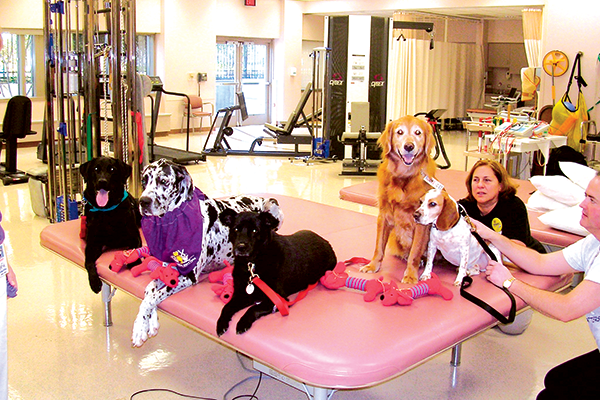Healing Through Pet Therapy
by Pamela R. Massey, PT, MS, and Nyla Jacobs, PT, MS
While dogs are being trained to detect melanoma, lung cancer, and many other diseases through smell identification, at M.D. Anderson Cancer Center, we have discovered another use for man’s best friend – animal-assisted therapy. Four years ago, the Rehabilitation Services Department developed a pet therapy program that uses dogs to assist therapists in providing occupational and physical therapy to people with cancer. WAGS (Welcoming Animals Giving Support) has become a favorite and successful therapy program for both inpatients and staff.
Twice a month, a special group of volunteers meets in the rehab therapy gym. These volunteers, along with their dogs, have spent countless hours training in order to participate in pet therapy. To carry the title of “pet therapy dog,” each dog must pass an extensive temperament test and successfully pass special obedience training.
Introductions begin the first part of the pet therapy session. The laughing and personal bonding between participants, or between participants and dogs, and the act of sharing with the group are therapeutic activities. After the introductions, the participants and dogs are dispersed for therapeutic activities depending on each person’s individual needs. Petting, grooming, and leading the dogs in performing tricks can b done in a number of ways of positions to assist the therapists in exercising the participants’ different muscles. For example, a person can work on his or her standing endurance and balance while petting the back of a Great. Dane.
Pet therapy has done much for our institution. Not only have the participants benefited from the bi-monthly visits, but the staff has as well. Each. dog and owner bring a unique quality to the sessions. Even the dogs are very enthusiastic, they appear to be aware they are visiting people with sensitive medical conditions. This is conveyed by the gentleness of each dog and the overwhelming friendliness and kindness each dog shows the participants.
Pamela Massey is the director of Rehabilitation Services and Nyla Jacobs is a senior physical therapist in the Rehabilitation Services Department at M.D. Anderson Cancer Center in Houston, TX.
This article was published in Coping® with Cancer magazine, July/August 2007.


